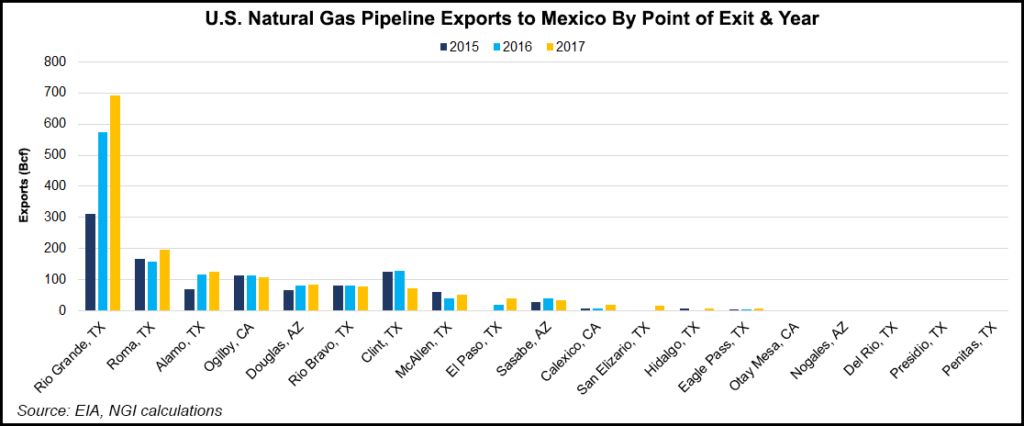NGI The Weekly Gas Market Report | Mexico | NGI All News Access | NGI Mexico GPI
Mexico Natural Gas Market Holds Promise, Says BP Exec
BP plc only began marketing natural gas in Mexico last year, but it already has identified several ways in which it could be more efficient, according to the head of the North America gas marketing and trading arm.

Speaking earlier this month at the LDC’s US-Mexico Natural Gas Forum in San Antonio, TX, BP Energy Co. CEO Orlando Alvarez told a lunch gathering that permitting, invoicing and reporting processes could be simplified. He also suggested increased availability of real-time data and a more transparent open season process for access to new pipeline capacity.
Alvarez should know of which he speaks. BP plc is — and has been for years — the largest natural gas marketer in the United States and Canada, according to NGI’s Top North American Natural Gas Marketers ranking, which is done quarterly. During 2Q2018, BP marketed 21.19 Bcf/d across North America, far and away above any other marketer on the continent.
“We understand the market is complex and there’s a lot of things that are still evolving,” Alvarez said. “This is not BP saying things are broke…It’s an opportunity that we believe, if you look at some of the most efficient gas markets, [will] help make it more efficient.”
BP EnergÃa México, the UK-based major’s Mexico gas trading unit, was one of three winners in Mexico’s first auction to reserve natural gas import capacity in February 2017. Currently, it transacts about 400,000 MMBtu/d (390 MMcf/d), equal to about 5% of Mexico’s 8 Bcf/d gas market, and it serves more than 20 customers across eight states.
BP expects its marketing footprint in Mexico to continue growing into next year, Alvarez said.
As BP EnergÃa México has built its business over the last 18 months, one challenge for the company has been the permitting process for importing gas, he said, which has become “burdensome.”
He explained that each time shippers want to import U.S. gas from a new import point, they must file for a new permit, with an approval process that can take up to 90 days. A solution could be to allow marketers a blanket import permit that applies to all import points, Alvarez said, as is the case in the United States.
BP has experienced occasions where customers were waiting on gas deliveries, and the 90-day period was “too close for comfort,” he said.
The process of invoicing customers is also more complex and time-consuming for shippers in Mexico than in the United States, Alvarez said, a challenge compounded by a lack of natural gas meters within the system.
System-wide investment in meters would allow users to have more precise real-time data, which would in turn facilitate the creation of an intra-day gas market and a secondary firm capacity market like in the United States, Alvarez said, which would benefit all parties involved.
Finally, a simplified open season process for new pipeline capacity modeled after the United States would “enable the optimization of [the] system as supply sources evolve and new customer load growth materializes,” he told the audience.
Despite these and other challenges, such as the nationalist rhetoric of President-Elect Andrés Manuel López Obrador and local opposition to pipeline projects, Mexico’s transition toward a competitive and open natural gas market has “done really well,” Alvarez said.
“I can personally look at my bosses up the line and say, ”Look, we went into Mexico a year and a half ago…and I see a lot of progress has been made.”
The BP executive concluded by saying that his company has had an overwhelmingly positive experience in its relationships with national oil company Petroleos Mexicanos and state power utility CFE, as well as with national pipeline system operator Cenagas, energy ministry Sener, and energy regulatory commission CRE.
© 2024 Natural Gas Intelligence. All rights reserved.
ISSN © 1532-1231 | ISSN © 2577-9877 | ISSN © 2577-9966 | ISSN © 1532-1266 |
